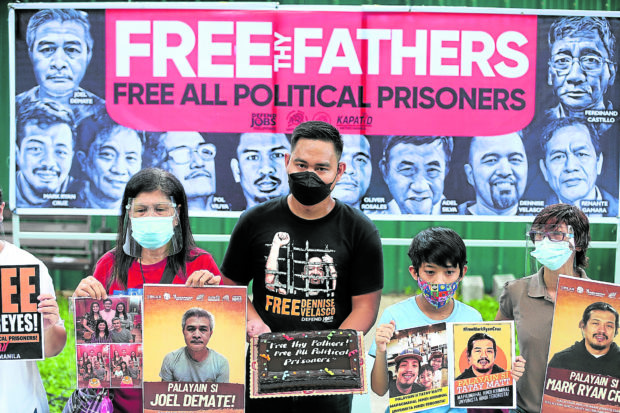Human rights groups must sharpen communication strategy – study
MANILA, Philippines — After being called conspirators against the government, human rights (HR) organizations need to “take back the political narrative” and step up their communication strategies to win the so-called information warfare, according to a new study highlighting the movement’s struggle to better connect with the public.
Among the findings of the study titled “Human Rights in Survival Mode” is that many of these groups still lack effective communication strategies—with some seeing it as mere “peripheral” work to their advocacy and grassroots campaigns—that have left them more vulnerable to targeted disinformation and attacks.
The Asia Foundation-funded report by US-based Filipino scholars Jonathan Ong, Jeremy Tintiangko, and Rossine Fallorina reached this conclusion after interviews with workers from 41 local and Philippine-based international human rights groups and sectoral allies from December 2019 to March 2020.
The study published by Harvard Kennedy School is also a rare scholarly glimpse into the perceived gaps of the human rights movement, which is experiencing an “unprecedented crisis” of legitimacy in a highly polarized society.
While attacks against them are not exactly new, there’s “something about this current moment that’s different in terms of being attacked and harassed,” Ong said in an interview with the Inquirer.
Take control of narrative
But even while caught in the crosshairs of the “information warfare” launched by pro-Duterte supporters, human rights organizations simply “have left this battle, have not participated [in] this warfare, or not coped with it enough. They mentioned being attacked but if you look at their investment [in terms of expertise or workers], it’s really lacking,” he added.
This is also why their messaging often starts strong but tapers off, allowing disinformation agents — troll farms and pro-Duterte influencers — to take control of the narrative and mislabel human rights work as a “conspiracy” to destabilize the government.
“We even have examples of [organizations] who have stopped using the term human rights because it has too much baggage,” Ong noted. “But if you stop using it, you’re allowing the [administration] to set the terms of what human rights is.”
Among others, the study found that many human rights groups treat communication “as a set of disparate tools, activities and platforms rather than as a long-term and cohesive strategy to take back control of the broad political narratives and reshape the public engagement with, and perception of, human rights.”
In fact, only 16 out of the 30 organizations they interviewed have a full-time communications staff member. Often, this work is given to the advocacy or community officer.
Many of these staffers, the study found, are also “rarely supported with additional training and equipment.” Many groups struggle to divert funding for stronger communications work while others maintain that their responsibility is to “help the most vulnerable.”
Shift in public trust
Unsurprisingly, this has left them just as exposed. Due partly to President Duterte’s unsubstantiated rhetoric against human rights workers—accusing them of being organizations of demons and supporters of criminals, addicts, or communists—the movement has seen a sudden and dramatic shift in public trust.
Many social and development workers interviewed for the report, for example, occasionally felt unwelcome in villages and schools. Often, they said, the military had warned residents against interacting with the “activists” who supposedly wanted to indoctrinate them in communist thought.
Online, human rights workers are also subjected to a smear campaign by trolls and disinformation networks which has taken a massive toll on their mental health. Among other things, they are accused of being more sympathetic to criminals and being beholden to foreign funders, thus casting doubt on their integrity and criticism of Duterte’s policies.
Even so, Ong said, many organizations have yet to invest in cybersecurity infrastructure and resources to empower and protect many of their front-liners.
Some, especially veteran advocates, do not feel the need to innovate their campaigns which mostly rely on stoking anger and indignation—the “-ismos: pasismo, imperyalismo, kapitalismo,” as Ong describes it—and thus fail to capture broader audiences.
Relatable issues
“Sometimes human rights organizations are so focused on their principles and -ismos and jargon, but they have to be understood by the masses, too,” he said. “They need to be following these conversations using the language that most people can understand and resonate with.”
Of course, the movement is not without pioneers. The study shows, for example, that groups like Metro Manila Pride and Child Rights Network have defied the “doom-and-gloom” traditional campaigns by using a positive and creative communications approach.
These initiatives, it said, were less about jargon and more about human stories of success and empowerment. By making the advocacies for gender equality and children’s dignity more relatable, the groups made waves in mainstream campaigns and were more successful in legislative lobbying.
Human rights organizations also have to face the public’s real feelings of disenfranchisement — which hold them captive to a populist president—instead of just “staying above the fray,” Ong said.
Specifically, the study called for advocates to “speak their language and meet them where they are” rather than dismissing their fears and anxieties.
